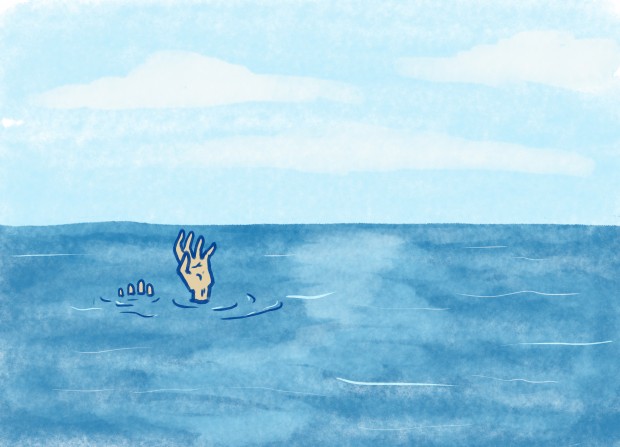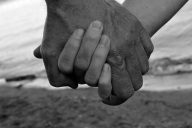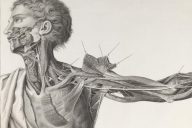“It wants me. It does not seize me, but it is persuasive. Another mouthful of water.”
The water laps warm around my shoulders. I tread water, breathing deep, looking across the surface toward the floating docks. My friends call to me, waving their arms, smiling. I’m far out into the lake, so deep that my toes can’t touch the reeds and water grass anymore. The sun is high in the air.
They want me to come back in. I can hear them, their voices slinking to me along the waves. Billy’s older brother brought more beer. The heat of the sun pounds on my skull and beer already drunk bubbles in my belly. I swim toward them, taking a few strokes, tired from so much time in the water.
The girls all smile, all look so pretty, bodies tan and slick with sweat. The boys all yell, wave the cans of Natty over their heads, call me names and grin.
A pain in my thigh. I look down, instinctively, and my nose and mouth slip beneath the water. I’m not thinking. I can’t be thinking. I look up and cough and sputter and none of them move. I don’t think they can see me.
My leg cramps up and I can’t keep kicking. My arms flail. I try to push against the water, pull myself into the air where I belong.
![]()
The boat rocked back and forth. Alan could only sit there, watching, waiting for a ghost to rise from the surface of the water. Once or twice he saw the shapes of divers moving beneath the shallow waves, but they faded again and he was left alone, hand on the silent motor. The day had been sunny but the sun began to vanish behind the far mountain, an orange crescent of light shrinking across the valley. He sat back, listened, watched. For a long time nothing came.
He knew the boy. Had known him. For a time when his son Kyle was maybe four or five this boy had shown up on their doorstep every day, all gap-toothed smile and blue eyes. As Kyle had grown they’d seen more of the boy; they played football together, went to high school. But for him this boy, now six and a half feet tall, had always just been that small kid on his doorstep, looking up, suspended in time even before the day at the lake.
He could hear them on the shore, crying, calling out. He didn’t know why the police hadn’t shooed them away. They’d gathered there to swim and drink on the last day before senior year, forget their looming adulthood for a while. He knew most of these kids, too, had watched them sprout taller and stronger and angled. Kyle stood near the floating dock, arms crossed over his bare chest, expression fuzzy at this distance. Alan looked once at his son and then away again, afraid he’d see him looking, afraid that younger eyes could see the expression on his face.
Being on the boat was pointless, except to keep it from floating too far from where the divers had gone down, to ferry them back from the depths. It wasn’t like his paramedic training would be of any use on what they found. He crossed his ankles, rubbed at the stubble on his cheeks.
When the ambulance and police had arrived, the gathered children said the boy had just disappeared, that he’d been swimming fine and then they realized they hadn’t seen him for a while. Kyle and two other boys had dived in after him, spent the whole time until EMS arrived combing the lake as best they could, calves cramped and lungs sore from held breath. Alan had needed to drag Kyle out of the water, restrain him, to keep him from searching.
But when the call had first gone out and Alan heard where they were going, for a few long, electric seconds he’d expected it to be his son, his boy, his only child. Dread seized him until he’d gotten there and seen Kyle, buzzed dark hair and limbs too long. Hair that Alan had buzzed for the first time when Kyle was three, shearing away curls because that young boy would need to be strong. Limbs that had once been so fat and round and fragile that Alan had feared watching him learn to walk. Just the night before Kyle had fallen asleep on the couch, bent and too tall to fit, and as he’d passed the living room Alan wondered who this man was, when he’d replaced the bundle Alan had carried home from the hospital.
A hand slapped against the edge of the boat and Alan looked down at the diver, who shook his head and tugged out his mouthpiece. The boy was deep, and it would take time to bring him up. Alan nodded and the diver took another mechanical breath before sinking again, fading into the murk.
His stomach still clenched, Alan glanced again at Kyle as if he might vanish, as if he’d been swimming fine until his leg cramped and he sank forever, lost in childhood.
![]()
You stand by the water, watching your father out on the boat. The lake is glassy now, your sun-torched skin whipped by the cool wind blowing down from the far mountain. You stand apart from your friends, away from the crushed cardboard and trampled mud of the party. It’s been too long – he is dead. You know that. And yet you half-expect the surface of the water to erupt with blinding light as he rises up, unharmed, scared but alive.
Your muscles throb with the effort of having dived into the water, swum deep and futile searching for him. People don’t float when they drown like they do in the movies. Instead they sink down, drawn into the maw of the water. But you’d gone after him anyway, thought of his blue eyes behind a facemask across from you in the huddle, of his screechy laugh when you told him you kissed that girl from chemistry. You wouldn’t let him go. You couldn’t.
And you’d kept going, diving in, clawing at the water. It yielded nothing. By the time you heard the sirens, your father’s hands had closed around your raw shoulders and pulled you out, arms wrapped around you and held you back. “Wait,” he said, voice still. “Wait. We’ll get him. Just wait.”
Wait. Yeah, alright. You’d done enough waiting; you should have been out there with him, been close enough to help. You clasp your hands behind your head and lean back, look up at the sun, look over at the ambulances and the police and the EMS all huddled together, police with their notepads out. They’ve talked to everyone already, taken statements, as if a crime had occurred here, like drinking at seventeen and swimming with friends were unusual in this backwoods town.
Out on the water you see one of the divers rise, back turned to your father’s boat, and you see the water distort where the other diver rises beside him. One of the girls behind you starts to cry again, her voice soft, fading as it approaches the water. You turn to the girls, yank your bare feet from the mud. They’re pale-faced, eyes frozen open, looking out over your head as the outboard motor revs up and digs into the water. You don’t want to see what your father might be bringing back, but you turn anyway, look back.
He is there, arms spread stiff, huddled on the boat between your father and the divers.
As he drives you home later your father says nothing. You expected some sort of lecture, some punishment for drinking, an examination of what you did wrong like this is just another football game. The sun is long dead, the cab of the truck dark except for the edges of the headlights, reflected back just enough to light your face. For a while the silence is nice, the departure from the norm is a relief, but as the drive drags on and the truck winds its way back through town you start to wish he would yell, that he would blame you. He doesn’t yell because he does blame you. It is your fault, and you can see it in the eyes of his reflection in the rearview mirror.
When you arrive home your mother crushes you in a hug and sobs into your shoulder. It was on the news, and she’d thought it had been you. “The victim’s name is being withheld pending notification of loved ones.” Journalists think they’re doing families a favor until you realize it could be anyone, everyone. It could have been you. Maybe it had been. You pat your mother on the back and after a few moments wrench yourself from her grip, tell your parents you want to go to bed.
As you pass him to go up the stairs your father reaches out, runs a callused hand over your close-clipped hair. He smiles at you and it’s like a death sentence: Don’t feel bad, but there’s something to feel bad about.
You climb the steps and collapse into your bed without changing out of your swim trunks or turning out the light. Lying there for a while, conditioned air frigid on your burned skin, you look at the ceiling and wonder who or what would let this happen, why anyone would bother building churches to them. All the power in the world and – nothing. No savior, not this time. Someone, anyone, to blame but yourself.
As you lie there you reach into your pocket and tug out your phone, hold it up and let the glow of the screen wash over you. You’re half-convinced by the drone of the a/c and the blinding dark of the room that nothing has happened. You pull up his name in your contacts, pause, breathe deeply, and then hit the dial button. The phone rings but rather than the familiar buzzing it plays “Stand By Me.” You’d laughed yourself silly the first time you’d called him on that phone, so hard you nearly missed his irritated explanation that the world needs a little more comfort.
![]()
On that long drive home that night Kyle had flinched every time Alan had shifted in his seat or cleared his throat, like he expected a sharp word or a smack across the forehead. Alan’s hands were so tight on the steering wheel that beads of sweat ran down the polyurethane, slicked up his grip when he tried to turn. Alan said nothing, smiled at Kyle and watched the boy duck like he’d been shot at. It stung. Alan sat up that night, watching television in the dark, listening to the sounds of Kyle’s floor shifting as he paced in the room above.
The next day Kyle, usually so social and eager for human contact, lay sprawled on his bed for hours at a time. While his son could cut himself off and grieve and think about what had happened and what had been lost, Alan had to get up the next morning and go back to work. People keep dying, keep having accidents, falling into holes and dropping too much acid and shooting themselves over a lover. In this town there was less gunning and more drugging, and the first call of the day was a homeless man who’d bought bad heroin. Alan made no judgments, hauled the seizing man onto a stretcher and into the back of the ambulance. The man’s smoke-stained beard was flecked with vomit and as Alan pushed a mask over the man’s nose and mouth he was careful not to touch it. Wild eyes stared up at him, pleading for mercy that wasn’t Alan’s to give. They gave him charcoal and he’d stopped thrashing by the time they got him to the hospital.
Afterward Alan sat with his boots up in the response room, deep in the hospital basement where there were no windows and only yellowing lights to brighten their day. He rubbed and closed his eyes and saw phantoms shifting beneath shallow water. When he looked around again the response room was the same, loud with his coworker’s gossip and jokes in the corner, geometries shifting and waving on the computer screens around him.
The first call after lunch was a young girl who’d run a red and t-boned an elderly man who was dazed but unhurt. The girl was folded into the car like the last bit of steak gristle in aluminum foil, slumped forward over the steering wheel, the engine of the car in her lap. The speed at which the paramedics worked was a formality. They pushed the car open with the jaws, cut apart the steering column, and pulled her out, her bloodied head bumping Alan’s shoulder. They said nothing. People cried in the streets.
When they returned to the response room Alan’s coworkers laughed and joked again, gathered in the corner, did not mention what had happened. When they left again for the heart attack on the north side of town Alan only rubbed at his eyes, willing them to stop itching, wishing his stomach would settle. He could still see the boy being heaved spread-eagled into the boat, blue and ivory skin dull in the dying light.
When he returned home his wife Louise smiled at him, hopeful, and while he smiled back it felt like a grimace. She’d bought a sympathy card, fields of clouds arranged around a blurry, glowing something on the front. He signed it but didn’t write anything else, not knowing what else to say.
“Kyle’s been in his room all day,” Louise said, setting the card aside without sealing the envelope. “Can you call him down for dinner? I’m making stir fry.”
Alan nodded, looking at the card on the table, feeling empty but not from hunger. He scratched his stomach and looked up and after a time headed for the stairs. He thought about the times when he’d done this before, when he’d climbed the steps after football games, after losses, after fumbles, from the time Kyle was very small, about how when he would reach Kyle’s room he would tell him it meant nothing and that he had to man up and come downstairs.
It’s fine, Alan had said. You should have tucked the ball closer as you ran. You should have juked left. You should have seen the linebacker coming. But it’s fine – now stop crying. It’s nothing.
Alan stood outside Kyle’s room, hand raised like he was going to knock. He could hear Kyle in there, rustling on the bed, tossing and turning. Alan breathed deeply and then knocked, only heard an annoyed grunt in response. “Hey, kid,” Alan said through the door. “It’s me.”
This time Kyle didn’t bother answering. Alan opened the door and there was Kyle, as he’d expected, sprawled out on his bed still wearing his swim trunks from the day before. Their eyes met and neither said anything and to Alan Kyle looked like he could barely stand lying there, like he didn’t want to be around other people but he didn’t want to be by himself, either.
“Your mother’s making dinner,” Alan said. “It’ll be ready shortly.”
“Okay,” Kyle said.
Silence again. Alan’s hand still rested on the doorknob.
Resting on Kyle’s stomach was his phone, open to some picture on Facebook. It was too small, too far away for Alan’s aging eyes to see but he knew who was in the picture, who would be in every other picture in that album.
“Which one are you looking at?” Alan asked.
Kyle took his time answering, lifted the phone from his belly and looked at it for a long second, didn’t raise his eyes as he said, “That picture of him and me from before two-a-days started last week.” Another pause, not as pronounced this time, and then Kyle said, “I forgot he had that stupid gap in his front teeth.” He grinned, ran a hand over his buzzed head. “You see it every day and you… you forget.”
If Kyle had been younger, if their relationship had been better, Alan would have crossed the room, sat on the end of his son’s bed, clapped him on the knee a couple times. Somehow the knee is the most easily comforted part of the body, or it had been when Kyle was smaller. Now, though, Alan stood there, hand still on the doorknob.
“It’s gonna be hard for a while,” Alan said. “For all of us.”
Kyle looked hard at him. “Yeah,” he said.
“I don’t wanna tell you how you’re gonna feel,” Alan said, “’Cause I don’t know. I really don’t. But we knew him, too, just as long as you did.”
“I know,” Kyle said.
“We’re in this together,” Alan said. “So… so just let me know if you need anything, okay?”
“Yeah,” Kyle said, and then was silent.
“Alright,” Alan said, nodding, more for something to do than for anything else. “Good. So, uh… so make sure you come down for dinner.” He turned to leave, stomach clenching as he went, but just as he had turned his back on Kyle he heard his son’s voice say, “Hey, Dad?”
“What’s up?” Alan said, looking over his shoulder.
“Thanks,” Kyle said. Alan smiled at him, nodded, closed the door and left his son to sift through what was left of fourteen years.
![]()
Even with your parents and friends nagging you, you don’t leave your room much over the next few days. Dinner\, occasionally watching TV, sitting on the porch when friends come by to check on you – otherwise you lie on your bed, staring at the ceiling, going through old photos. Other people start posting on his Facebook wall, short notes about how sorry they were or long essays, especially from girls, filled with memories and tearful goodbyes and pleas to God. Your jaw stiffens when you read some of these – partly because some of these people barely knew him, partly because if there was any point in pleading to God none of this would have happened.
The first time you leave the house is to go to the funeral. You don’t have much choice. Your father tells you that this is your only chance, that if you don’t go you will regret it, maybe not now but someday and for the rest of your life. You don’t have the heart to tell him you’ve seen Casablanca.
All of your friends are there. Practically the whole school is there. He was an all-conference football player, won the Fair Play Award for sportsmanship and community service. He was in the choir at the church even though he couldn’t sing worth a damn and volunteered every Easter and Thanksgiving at St. Frank’s Soup Kitchen. You and he had fought some of the other football players who’d been picking on those freshmen Yu-Gi-Oh! nerds. His grades had been shit but he’d been sweet to the teachers and they’d all looked out for him, tossed him soft-ball bonus questions to keep him from failing. Everyone loved him. You loved him, in that way that soft way men do without ever telling each other.
You sit in the back pew with your friends, shoulder-to-shoulder, hands in your laps. The casket sits in the aisle in front of the altar, the priest standing over it, arms spread wide. He says some words that don’t mean anything. At least, you don’t think they do, not anymore. You watch the priest pretend to comfort the family, when he’d known your friend since his birth and probably felt as bad as all the rest of you.
His oldest brother says the eulogy. It’s sad but typical, about being taken too young, about reaching out to the community, about being one of many.
His mother cries in the front row, head in her hands, shaking shoulders visible even from the very back. You look down the pew at your brothers, and they look back at you. All of you had planned this, once you’d known you could never keep yourself from coming to the funeral.
His brother sits down and your football team stands up, put arms around each others’ shoulders. You begin to sing, swaying back and forth in the pew. The priest stood at the lectern, jaw near his toes, but your friends mother looks at you all through watery eyes as you sing, “When the night has come and the land is dark, and the moon is the only light we’ll see.”
Your heart is racing and as you look at his mother you feel your face burn. You sing the rest of the verse and when you get to the chorus a lump hardens in your throat. You glance to your right and see your brothers crying as well, openly, faces reddened and streaks of salt running to their jaws. You try to take a breath but it shudders. “So darlin’, darlin’, stand by me, oh, stand by me, stand, stand by me.”
Maybe God wasn’t there that day. You don’t know. As you sob your way through the rest of the song, your body shaking, knees soft as an infant’s, you wonder what it matters. You didn’t need him. No one did.
![]()
We don’t realize just how hard it is to swim. Swimming takes effort, concentration, coordination. We don’t do it instinctively. We struggle when we don’t know how, fight, desperate. My limbs are leaden. The water is inviting. I push against it and gasp for breath and I am rewarded with a mouthful of the lake.
It wants me. It does not seize me, but it is persuasive. Another mouthful of water. My chest heaves, my legs do not kick. They can’t see me.
I am sinking down, arms heavy, pain in my leg gone and replaced with a numbing, a buzzing. I don’t worry so much. The water swallows my eyes and now I can’t see my friends any more than they see me. Around me the green and brown world rises up, filling my vision, pressing in on me in a soft embrace. It does not hurt. I breathe once, twice, and I think of my first breath, when I was pushed out into the cold world with a scream. This time it is silent.
As the darkness rises, the warmth fades, I fear nothing. Over me I see the rippling disc of the sun. The water comforts me, and all I hear is the low whisper of its voice as I look upward.
*
Art by Yvonne Martinez.


















